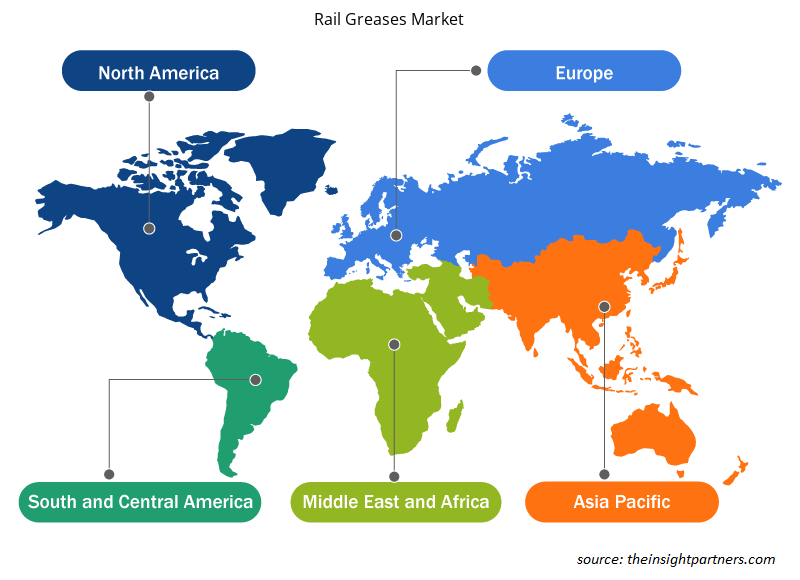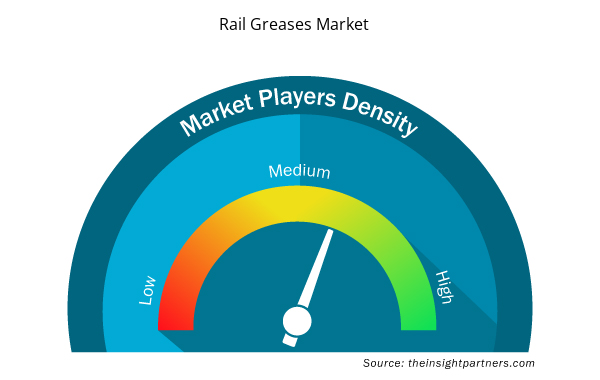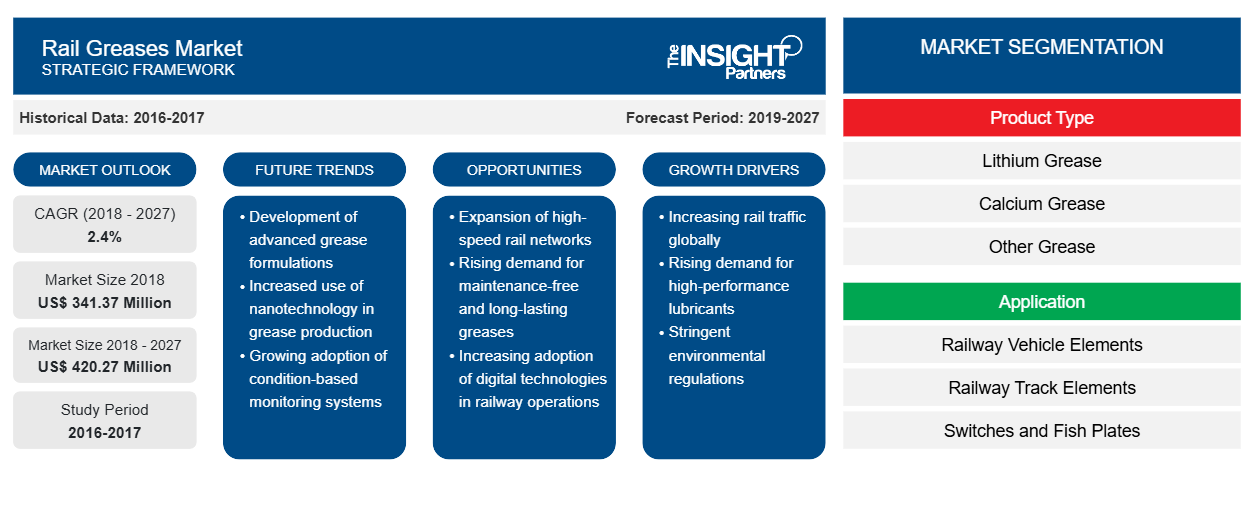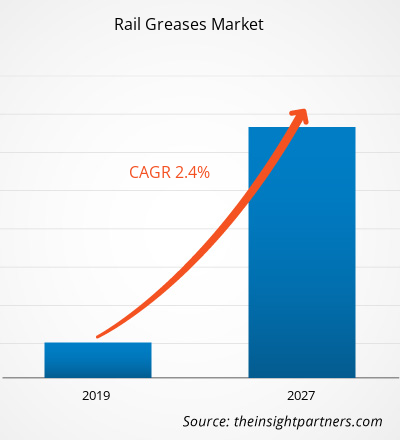鉄道グリース市場は2018年に3億4,137万米ドルと評価され、2027年までに4億2,027万米ドルに達すると予測されており、2019年から2027年にかけて2.4%のCAGRで成長すると予想されています。
グリースは、固体または半固体の潤滑油です。通常は鉱油と、カルシウム系石鹸やリチウム系石鹸などの増粘剤で構成されています。グリースには、二硫化モリブデン、グラファイト、ポリテトラフルオロエチレン (PTFE) などの追加の潤滑粒子が含まれていることもあります。さまざまな種類のグリースが、油の潤滑特性と粘着性を組み合わせており、潤滑剤が表面によく付着します。グリースは、摩擦を起こす高い初期粘度などの特徴を備えています。自動車、鉄道、建設、製薬、食品・飲料、鉱業など、さまざまな業界で広く使用されています。レールの場合、頻繁に潤滑が必要で、潤滑油が長時間留まらないメカニズムにグリースを使用できます。グリースは、水や非圧縮性物質の浸入を防ぐシーラントとして機能します。グリースは、汚染物質の侵入や潤滑剤の損失を防ぐため、鉄道の車軸や車輪、ベアリングやチェーン、ブレーキ部品、内装部品、パンタグラフ、鉄道線路部品など、さまざまなレール部品のメンテナンスにも使用されています。
2018年、アジア太平洋地域は世界の鉄道グリース市場で最大のシェアを占め、予測期間中に最も急速に成長する地域になると予想されています。この地域の鉄道グリース市場の成長は、主に経済の活況、急速な都市化、新興国政府による鉄道インフラ開発への投資の増加によるものです。この地域の国々は、都市鉄道システムをより効率的で信頼性が高く、乗客に優しいものにするために、最先端の輸送技術を実験しています。アジア太平洋地域の地下鉄システムは、半自動から無人/無人列車運行へと徐々に移行しています。今後のシステムのほとんどは、通勤者の快適さと安全性のために最先端の技術ソリューションの導入を導入しています。したがって、鉄道グリース市場はこの地域で急速な成長を遂げると予想されます。さらに、この地域の従来の鉄道ネットワークのデジタル化に向けた多数の政府の取り組みも、予測期間中に鉄道グリース市場の成長を牽引するでしょう。
要件に合わせてレポートをカスタマイズする
このレポートの一部、国レベルの分析、Excelデータパックなど、あらゆるレポートを無料でカスタマイズできます。また、スタートアップや大学向けのお得なオファーや割引もご利用いただけます。
- このレポートの主要な市場動向を入手してください。この無料サンプルには、市場動向から見積もりや予測に至るまでのデータ分析が含まれます。
COVID-19パンデミックによる鉄道グリース市場への影響
COVID-19パンデミックは2019年12月に武漢(中国)で発生し、それ以来急速に世界中に広がっています。2020年7月現在、確認された症例数と報告された死亡者数で最も影響を受けている国には、米国、ロシア、インド、イタリア、中国、スペイン、フランス、ドイツがあります。パンデミックは、強制的なロックダウン、渡航禁止、事業停止により、経済と産業に影響を及ぼしています。COVID-19の発生が拡大した後、サプライチェーンの断絶、ロックダウンによる製造の混乱、この発生によるオフィスの閉鎖により、鉄道グリースの需要はさまざまな地域で阻害されています。アジア太平洋や北米などの主要地域のさまざまな工場のロックダウンは、鉄道グリースの製造、配送スケジュール、販売に影響を与えており、世界の鉄道グリース市場に悪影響を及ぼしています。
市場分析
鉄道輸送で使用されるさまざまな部品の定期的なメンテナンス活動
車軸と車輪、ベアリングとチェーン、ブレーキ部品、内装部品、パンタグラフなどの鉄道車両部品は、スムーズな走行と高性能のために頻繁なメンテナンスと潤滑が必要です。車輪にグリースを塗布すると、人件費の削減、修理間隔の延長、潤滑剤の消費量の削減など、さまざまな利点があります。鉄道車両部品にグリースを使用すると、機器の信頼性の向上、計画外のダウンタイムの削減、エネルギーと燃料の消費量の削減、機器の収益性の向上など、さまざまな運用上の利点があります。さらに、グリースはエネルギーの節約と騒音の低減にも役立ちます。車両軌道システムの車軸箱ベアリングは、線路と台車の間でさまざまな複雑な確率的荷重を支える鉄道および列車の台車の重要なコンポーネントです。車軸箱ベアリングの信頼性と耐用年数は、鉄道の安全性に影響を与える可能性があります。車軸箱ベアリングの潤滑不良は、高温車軸切断やベアリングの焼損などの事故につながる可能性があるため、グリースは鉄道車軸箱ベアリングの潤滑に大きな役割を果たします。さらに、グリースは、線路部品、ブレーキ、内装部品などの他の鉄道部品にも使用されています。線路部品に使用されるグリースは、摩擦を最小限に抑え、温度を下げ、車輪フランジとレールの間の摩耗を防ぐように設計されています。グリースは、線路要素の設置に使用されるネジやボルトにも使用され、錆びから保護します。したがって、レールグリースは、主に保守作業や、鉄道車両部品や線路部品などのさまざまな部品のスムーズな動作と高性能のために必要とされています。この事実は、予測期間中にレールグリースの市場を牽引してきました。
タイプベースの洞察
製品タイプに基づいて、鉄道グリース市場はリチウムグリース、カルシウムグリース、およびその他のグリースに分かれています。 2018年には、リチウムグリースセグメントが世界の鉄道グリースを支配し、予測期間中に最も高い成長率で成長すると予想されています。 リチウムグリースは、バターのような質感と350°Fを超える滴点を備えた多目的タイプのグリースです。 さらに、時折300°Fまでの温度でも使用できます。 リチウムグリースは、耐水性、耐分解性、耐軟化性に優れています。 リチウムベースのグリースは、他のグリースと比較して融点が高いため、鉄道用途で最も一般的に使用されています。 リチウムグリースは、ポンプ性が高いため、湾曲した歯のカップリング、カルダンシャフト、車軸ボックス、ブレーキシステムなど、鉄道や列車のさまざまな部品に使用されています。 鉄道輸送で使用されるさまざまな部品の定期的なメンテナンス活動により、予測期間中にリチウムグリースの需要が促進されると予想されます。
アプリケーションベースの洞察
用途に基づいて、レールグリース市場は、鉄道車両要素、鉄道線路要素、スイッチと継手プレート、曲線レール、およびネジとボルトに分類されます。鉄道車両要素セグメントは、世界のレールグリース市場を支配していましたが、曲線レールセグメントは、予測期間中に最も速い成長率で成長すると予想されています。潤滑剤は、車輪とレールの過度の摩耗を制御するために、曲線軌道で広く使用されています。グリースとオイルは通常、曲線の外側(高)レールのゲージ面に塗布され、車輪とレールの摩耗を減らすことに加えて、レール端のバッターと波形の成長率を減らすことが示されています。最近の研究では、効果的な潤滑にはエネルギーと燃料の消費を減らすという追加の利点があることが実証されており、多くの鉄道技術者が潤滑方法にさらに注意を払うようになっています。これにより、レールグリースの需要が世界的にさらに高まります。さらに、曲線セクションでは、高レール(外側曲線)ホイールがゲージ面上を走行します。これにより、半連続摩擦が発生し、ゲージ面とホイールフランジの摩耗が大幅に増加します。車輪とレールの接触面間の強い接触摩擦力は、曲線部で騒音を発生させます。そのため、摩擦を減らすためにグリースが使用されます。特に、急な曲線部が広がる市街地では、潤滑システムが悪名高い曲線部のきしみ音を減らすソリューションを提供します。グリースは、ゲージ面とレール上部の摩耗と曲線部の騒音を減らすために使用されます。そのため、レールの経済寿命を向上させるために、曲線レールの潤滑は簡単で経済的なソリューションであると考えられてきました。
流通チャネルに基づく洞察
流通チャネルに基づいて、鉄道グリース市場はオフラインとオンラインに分割されます。オフラインセグメントは世界の鉄道グリース市場を支配していましたが、オンラインセグメントは予測期間中により高い成長率で成長すると予想されています。世界中でデジタルチャネルの採用が増えているため、オンライン流通チャネルの重要性が高まっています。インターネットの使用率とスマートフォンの所有率は世界中で増加しており、消費者は調査の実施から最終的な購入決定まですべてをオンラインで行う傾向が高まっています。利便性、迅速な配達、安全な支払いオプションなど、いくつかの利点がB2Bバイヤーをオンラインでの購入に引き付けています。したがって、鉄道グリース市場で事業を展開している企業は、競争に遅れを取らず、ビジネスを継続的に成長させるために、過去数年間にわたって流通戦略を最適化してきました。企業は、従来のオフライン流通チャネルに加えて、市場の多数の顧客をターゲットにしてリーチするために、オンライン流通チャネルを採用しています。さらに、オンライン流通チャネルは、企業が追加のコストや経費をかけずにターゲット消費者にリーチするのに役立ちます。そのため、潤滑油やグリースの製造業者は、オンラインストアを開設し、これらのチャネルを通じて販売することで、電子商取引業界を活用して収益を上げています。
Royal Dutch Shell Plc (Shell)、Exxon Mobil Corporation、Total SA、BP Australia Pty Limited、Petroliam Nasional Berhad (Petronas)、SKF Group、FUCHS、Chevron Corporation、Klüber Lubrication、Sinopec Corp. は、世界の鉄道グリース市場で活動している主要企業の一部です。この市場の企業は、世界中で事業を拡大し、市場の高まる需要を満たすために、製品開発、工場拡張、合併や買収などの戦略に継続的に注力しています。
鉄道グリース市場の地域別分析
予測期間を通じて鉄道グリース市場に影響を与える地域的な傾向と要因は、Insight Partners のアナリストによって徹底的に説明されています。このセクションでは、北米、ヨーロッパ、アジア太平洋、中東、アフリカ、南米、中米にわたる鉄道グリース市場のセグメントと地理についても説明します。

- 鉄道グリース市場の地域別データを入手
鉄道グリース市場レポートの範囲
| レポート属性 | 詳細 |
|---|---|
| 2018年の市場規模 | 3億4,137万米ドル |
| 2027年までの市場規模 | 4億2,027万米ドル |
| 世界のCAGR(2018年 - 2027年) | 2.4% |
| 履歴データ | 2016-2017 |
| 予測期間 | 2019-2027 |
| 対象セグメント | 製品タイプ別
|
| 対象地域と国 | 北米
|
| 市場リーダーと主要企業プロフィール |
|
市場プレーヤーの密度:ビジネスダイナミクスへの影響を理解する
鉄道グリース市場は、消費者の嗜好の変化、技術の進歩、製品の利点に対する認識の高まりなどの要因により、エンドユーザーの需要が高まり、急速に成長しています。需要が高まるにつれて、企業は提供品を拡大し、消費者のニーズを満たすために革新し、新たなトレンドを活用し、市場の成長をさらに促進しています。
市場プレーヤー密度とは、特定の市場または業界内で活動している企業または会社の分布を指します。これは、特定の市場スペースに、その市場規模または総市場価値に対してどれだけの競合相手 (市場プレーヤー) が存在するかを示します。
鉄道グリース市場で事業を展開している主要企業は次のとおりです。
- ロイヤル・ダッチ・シェル(シェル)
- エクソンモービル株式会社
- 合計SA。
- BPオーストラリア株式会社
- ペトロリアム ナショナル ベルハッド (ペトロナス)
免責事項:上記の企業は、特定の順序でランク付けされていません。

- 鉄道グリース市場のトップキープレーヤーの概要を入手
世界の鉄道グリース市場 – タイプ別
- リチウムグリース
- カルシウムグリース
- その他のグリース
世界の鉄道グリース市場 – 用途別
- 鉄道車両要素
- 鉄道線路要素
- スイッチとフィッシュプレート
- カーブレール
- ネジとボルト
世界の鉄道グリース市場 – 流通チャネル別
- オフライン
- オンライン
企業プロフィール
- ロイヤル・ダッチ・シェル(シェル)
- エクソンモービル株式会社
- 合計SA。
- BPオーストラリア株式会社
- ペトロリアム ナショナル ベルハッド (ペトロナス)
- SKFグループ
- フックス
- シェブロン社
- クリューバー潤滑
- シノペック株式会社
- 過去2年間の分析、基準年、CAGRによる予測(7年間)
- PEST分析とSWOT分析
- 市場規模価値/数量 - 世界、地域、国
- 業界と競争環境
- Excel データセット



Report Coverage
Revenue forecast, Company Analysis, Industry landscape, Growth factors, and Trends

Segment Covered
This text is related
to segments covered.

Regional Scope
North America, Europe, Asia Pacific, Middle East & Africa, South & Central America

Country Scope
This text is related
to country scope.
よくある質問
In 2018, the lithium grease segment accounted for the largest market share in the global rail greases market by product type. Lithium grease is multi-purpose type grease with a buttery texture and dropping point above 350°F. Moreover, it can also be used with occasional temperatures up to 300°F. Lithium grease has excellent resistance to water and breakdown or softening. Lithium-based greases are the most commonly used in railway applications due to its higher melting point as compared to others. Lithium greases are used in various parts in railways and trains such as curved tooth coupling, cardan shaft, axle boxes, and brake system due to their high pumpability. Regular maintenance activities of different parts used in railway transportation is expected to drive the demand for lithium grease during the forecast period.
The major players operating in the global rail greases market are Royal Dutch Shell Plc, Exxon Mobil Corporation, Total SA, BP Australia Pty Limited, Petroliam Nasional Berhad (Petronas), FUCHS, SKF Group., Chevron Corporation, Klüber Lubrication, and Sinopec Corp among many others.
In 2018, the rail greases market was predominant in Asia-Pacific at the global level. The growth of the rail greases market in this region is primarily due to booming economy, rapid urbanization and growing investment by the government of emerging countries in the development of railway infrastructure. The countries across the region is experimenting with state-of-the-art transport technologies to make urban rail systems more efficient, reliable and passenger friendly. The Asia Pacific metro systems are progressively moving from semi-automatic to driverless/unmanned train operations. Most of the upcoming systems are introducing the deployment of cutting-edge technological solutions for the comfort and safety of commuters. Hence, the rail greases market is expected to experience rapid growth in the region.
Trends and growth analysis reports related to Chemicals and Materials : READ MORE..
The List of Companies - Pea Protein Market
- Royal Dutch Shell Plc (Shell)
- Exxon Mobil Corporation
- Total SA.
- BP Australia Pty Limited
- Petroliam Nasional Berhad (Petronas)
- SKF Group
- FUCHS
- Chevron Corporation
- Klüber Lubrication
- Sinopec Corp
The Insight Partners performs research in 4 major stages: Data Collection & Secondary Research, Primary Research, Data Analysis and Data Triangulation & Final Review.
- Data Collection and Secondary Research:
As a market research and consulting firm operating from a decade, we have published and advised several client across the globe. First step for any study will start with an assessment of currently available data and insights from existing reports. Further, historical and current market information is collected from Investor Presentations, Annual Reports, SEC Filings, etc., and other information related to company’s performance and market positioning are gathered from Paid Databases (Factiva, Hoovers, and Reuters) and various other publications available in public domain.
Several associations trade associates, technical forums, institutes, societies and organization are accessed to gain technical as well as market related insights through their publications such as research papers, blogs and press releases related to the studies are referred to get cues about the market. Further, white papers, journals, magazines, and other news articles published in last 3 years are scrutinized and analyzed to understand the current market trends.
- Primary Research:
The primarily interview analysis comprise of data obtained from industry participants interview and answers to survey questions gathered by in-house primary team.
For primary research, interviews are conducted with industry experts/CEOs/Marketing Managers/VPs/Subject Matter Experts from both demand and supply side to get a 360-degree view of the market. The primary team conducts several interviews based on the complexity of the markets to understand the various market trends and dynamics which makes research more credible and precise.
A typical research interview fulfils the following functions:
- Provides first-hand information on the market size, market trends, growth trends, competitive landscape, and outlook
- Validates and strengthens in-house secondary research findings
- Develops the analysis team’s expertise and market understanding
Primary research involves email interactions and telephone interviews for each market, category, segment, and sub-segment across geographies. The participants who typically take part in such a process include, but are not limited to:
- Industry participants: VPs, business development managers, market intelligence managers and national sales managers
- Outside experts: Valuation experts, research analysts and key opinion leaders specializing in the electronics and semiconductor industry.
Below is the breakup of our primary respondents by company, designation, and region:

Once we receive the confirmation from primary research sources or primary respondents, we finalize the base year market estimation and forecast the data as per the macroeconomic and microeconomic factors assessed during data collection.
- Data Analysis:
Once data is validated through both secondary as well as primary respondents, we finalize the market estimations by hypothesis formulation and factor analysis at regional and country level.
- Macro-Economic Factor Analysis:
We analyse macroeconomic indicators such the gross domestic product (GDP), increase in the demand for goods and services across industries, technological advancement, regional economic growth, governmental policies, the influence of COVID-19, PEST analysis, and other aspects. This analysis aids in setting benchmarks for various nations/regions and approximating market splits. Additionally, the general trend of the aforementioned components aid in determining the market's development possibilities.
- Country Level Data:
Various factors that are especially aligned to the country are taken into account to determine the market size for a certain area and country, including the presence of vendors, such as headquarters and offices, the country's GDP, demand patterns, and industry growth. To comprehend the market dynamics for the nation, a number of growth variables, inhibitors, application areas, and current market trends are researched. The aforementioned elements aid in determining the country's overall market's growth potential.
- Company Profile:
The “Table of Contents” is formulated by listing and analyzing more than 25 - 30 companies operating in the market ecosystem across geographies. However, we profile only 10 companies as a standard practice in our syndicate reports. These 10 companies comprise leading, emerging, and regional players. Nonetheless, our analysis is not restricted to the 10 listed companies, we also analyze other companies present in the market to develop a holistic view and understand the prevailing trends. The “Company Profiles” section in the report covers key facts, business description, products & services, financial information, SWOT analysis, and key developments. The financial information presented is extracted from the annual reports and official documents of the publicly listed companies. Upon collecting the information for the sections of respective companies, we verify them via various primary sources and then compile the data in respective company profiles. The company level information helps us in deriving the base number as well as in forecasting the market size.
- Developing Base Number:
Aggregation of sales statistics (2020-2022) and macro-economic factor, and other secondary and primary research insights are utilized to arrive at base number and related market shares for 2022. The data gaps are identified in this step and relevant market data is analyzed, collected from paid primary interviews or databases. On finalizing the base year market size, forecasts are developed on the basis of macro-economic, industry and market growth factors and company level analysis.
- Data Triangulation and Final Review:
The market findings and base year market size calculations are validated from supply as well as demand side. Demand side validations are based on macro-economic factor analysis and benchmarks for respective regions and countries. In case of supply side validations, revenues of major companies are estimated (in case not available) based on industry benchmark, approximate number of employees, product portfolio, and primary interviews revenues are gathered. Further revenue from target product/service segment is assessed to avoid overshooting of market statistics. In case of heavy deviations between supply and demand side values, all thes steps are repeated to achieve synchronization.
We follow an iterative model, wherein we share our research findings with Subject Matter Experts (SME’s) and Key Opinion Leaders (KOLs) until consensus view of the market is not formulated – this model negates any drastic deviation in the opinions of experts. Only validated and universally acceptable research findings are quoted in our reports.
We have important check points that we use to validate our research findings – which we call – data triangulation, where we validate the information, we generate from secondary sources with primary interviews and then we re-validate with our internal data bases and Subject matter experts. This comprehensive model enables us to deliver high quality, reliable data in shortest possible time.


 このレポートの無料サンプルを入手する
このレポートの無料サンプルを入手する